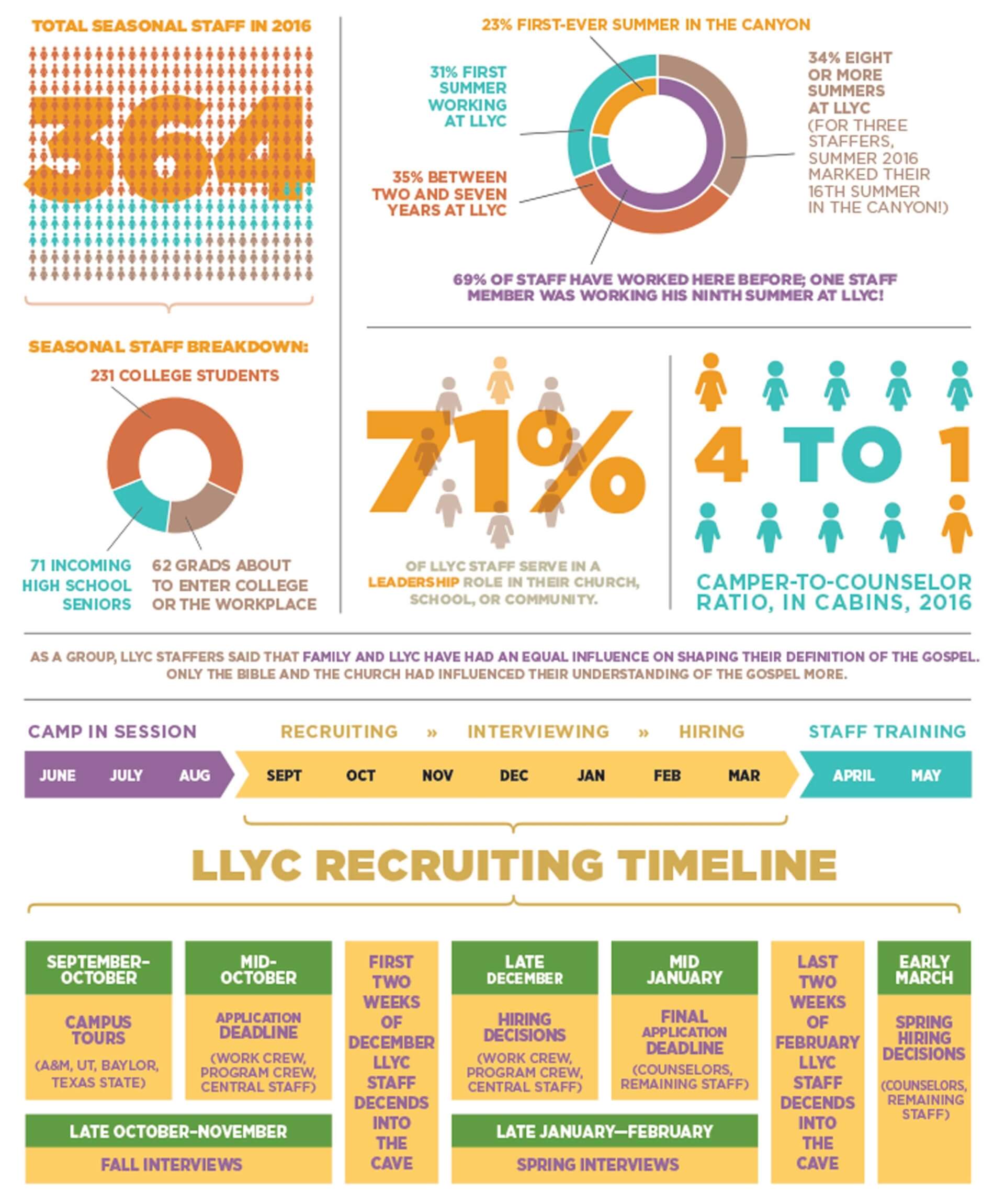
How does LLYC find seasonal staff willing to go to such extremes? By working really hard every fall, winter, and spring.
Their devotion pays off every summer when counselors like Adamson bring fresh ideas and courage to the Frio Canyon. Campers who witnessed his resurrection could not believe what they were seeing—an LLYC counselor rising from an actual grave.
Finding staff with that level of dedication and creativity is no small task.
Twice each year, the LLYC directors hide themselves away in a small, wood-paneled room on the backside of the Kerrville administrative offices and begin the mysterious process of choosing staff. The dimly lit room, lovingly referred to as the Cave, is part of the Archives building—as if the entire history of the Foundation back to 1933 stands behind their efforts—and they paper the light wood paneling with bright yellow sticky notes, each bearing the name of one potential summer staff.
“I love how they do the Cave,” said Lauren Niehues, an intern with Laity Lodge Family Camp. “You walk in there, and it is crazy to see all the names up on the wall.”
The process begins in the fall when directors shift from non-stop LLYC intensity to a steadier pace of recruiting their central staff, program crew, and work crew. By spring they shift their focus to the remaining counselors until they fill more than 350 seasonal positions.
It’s no small task to find several hundred college students to watch over our campers. They need to be trustworthy and careful, but also zany and creative. They need to be serious and spiritually grounded, but also light-hearted and open-minded. Finding and training these young leaders is the untold ministry of LLYC.
“During the summer, we’re camp counselors,” explains Beck Marlar, Director of Singing Hills. “The rest of the year, we are a college ministry, and our people
are scattered at different campuses” looking for college students who can fit the LLYC bill.
“The challenging part is the travel,” says Beck. Directors largely focus their efforts on cities and campuses with larger populations of LLYC staff. Austin, Waco, and San Marcos all have a strong LLYC network.
“But A&M has a huge turnout,” says Karla Heath, Director of Echo Valley and LLYC Internship program. She isn’t kidding. This past summer, 80 Aggies made up more than one-third of the college staff at Echo Valley and Singing Hills.
Once a campus network reaches that size, its recruitment efforts become self-sustaining.
One counselor recruited seven other college students to work for LLYC. “She had a really positive experience as a counselor,” says Heath, “so she went and told all of her friends, ‘You should totally come and work at this camp.’ ”
According to Marlar, there is only one way to keep this train going—continue the relationships.
The intentional focus on relationships draws counselors and staff like Morgan Vandever. “A lot of camps set up in our union at University of Oklahoma,” she explained, “and just recruit the students who walk by.” In contrast, LLYC recruits by cultivating long-term relationships that form an organic network of potential recruits.
“We host events at college campuses where people can bring their friends,” Heath said. Camp directors mix and mingle with the college students, catching up on how things are going with school and family and church.
Last year, LLYC hosted a successful tailgate party before one of the Texas A&M football games. “People are already at the game already hanging out with their friends,” Heath said. “They swing by our tailgate. We give them food. They talk to us.”
Since Vandever attends college at the University of Oklahoma, much of her application and recruiting process happens online and over the phone, and she happily drives six hours to Baylor when LLYC hosts events there.
“It’s so relational with all of the parties,” Vandever says, “so I will travel to Waco just to be part of the experience and the relationships.”
These relationships endure. In 2016, 77% of seasonal staff had either worked at LLYC before (69%) or were campers working their first summer (8%). Three members of seasonal staff were actually spending their sixteenth summer in the Canyon.
The high retention rate of seasonal staff creates an exciting ministry opportunity for LLYC directors. Traditional campus ministries like Young Life focus on reaching kids for the first time, then guiding them into a church family.
“We have people come back 9 years in a row,” Heath said, “so our ministry can’t be about introducing them to Jesus for the first time.”
Camp directors work hard to help staff understand their work as a calling and an opportunity for discipleship. High school volunteers on Work Crew, for instance, work through a custom Bible study together during their time in the Canyon. Abby Brossett said Work Crew is where she learned to serve without being paid or without any ulterior motive.
LLYC devotes just as much consideration in the Cave to its unpaid Work Crew staff as it does to its paid counseling staff. Every position, from the back room dishwasher to the director of program crew, receives serious attention and prayer.
No other counselors have been buried alive so far as we know, but all of them seem to have come to life in new ways as a direct result of their time at LLYC.
“It’s cool,” said Lauren Niehues, “to know they have been praying about me and my position in the Cave each summer. I can look at the wall and see, ‘Okay, I’m part of this whole group and this whole team.’ ”
